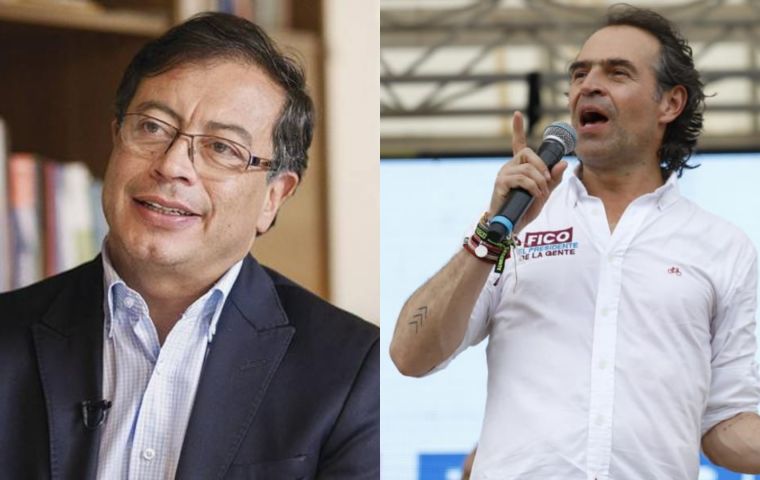MercoPress. South Atlantic News Agency
Complicated Colombian presidential election; left-wing candidate leads but with a ceiling in the runoff
 Gustavo Petro, ex guerrilla, ex Bogota mayor, leads with 37,9% vote intention and Fico Gutierrez, former mayor of Medellín follows with 30,8%
Gustavo Petro, ex guerrilla, ex Bogota mayor, leads with 37,9% vote intention and Fico Gutierrez, former mayor of Medellín follows with 30,8% Next Sunday Colombia will be voting for a new president and a last set of public opinion polls indicate that a left wing candidate, former guerrilla and ex mayor of the capital Bogotá has the most chances of succeeding current president Ivan Duque.
Under Colombian law opinion polls can only be made public up to seven days before the ballot event, and Guarumo EcoAnalítica, among the most reliable pollsters show that Gustavo Petro and Federico Gutierrez, Fico, former mayor of Medellín are clearly ahead and most probably will be in the June 19 runoff.
Accordingly, Petro and his Historic Pact party have a vote intention of 37,9%, one percentage point higher than at the end of April. He is followed by Fico Gutierrez, with 30,8%, virtually unchanged. The surprise is Rodolfo Hernandez, a former mayor of Bucaramanga, head of the Governors Anti Corruption party, who has a vote intention of 20,3%, a seven point increase since the end of April.
Worth mentioning is Sergio Fajardo from the Center Hope Coalition, who has lost two percentage points and now stands at 4,3%. The rest of hopefuls are below one per cent, with blank votes 2,3% and those not replying or don't know, 2,2%.
The poll also asked about possible scenarios in the June runoff since no candidate is expected to win a clear majority in the first round. Petro in effect would garner 45,7% of the vote while his main opponent Fico Gutiérrez 42%, which from a statistical point of view is considered a tie, given the plus/minus 2,5 percentage points error.
A runoff of Petro with Rodolfo Hernandez, would have the former Bogota mayor ahead with 45,2% against 41,5%. In other words the Colombian electorate is divided among two main forces, with a ceiling for the left wing hopeful.
However given decades of guerrilla warfare and violence, the abstention percentage in Colombia is usually very high.
The Guarumo EcoAnalítica probabilistic poll was done between 16/19 May and included 2,258 interviews of Colombian voters, (plus 18-year), with a 2,5% error margin and 95% of certainty. Nevertheless it must also be taken into consideration a report from Colombia's ombudsman regarding violence in the country. Of the 1,123 municipalities, at least 521 (46,3%) are “exposed to human rights vulnerabilities during the electoral period,” mainly because of the presence of illegal armed gangs. Of the 521 exposed municipalities, 84 are considered of 'extreme gravity'.
“Government must ensure protection in rural zones to guarantee the free participation of voters”, said Carlos Camargo head of the ombudsman office, particularly in the region of Antioquia, dominated by the Golfo Clan, a paramilitary group and the largest drug cartel, whose leader was recently extradited to the United States.
Colombian Home Secretary, Daniel Palacios said that government will be deploying 210,000 armed forces members and 95,000 from the police to guarantee security, before, during and after voting day. And Defense minister Diego Molano revealed that all “candidates are protected by special forces which enable them to campaign in every corner of the country”
Nevertheless the Ombudsman office recalled that in the recent legislative elections last March, abstention reached 45% of the electoral role (18 million out of 38 million registered).




Top Comments
Disclaimer & comment rulesCommenting for this story is now closed.
If you have a Facebook account, become a fan and comment on our Facebook Page!